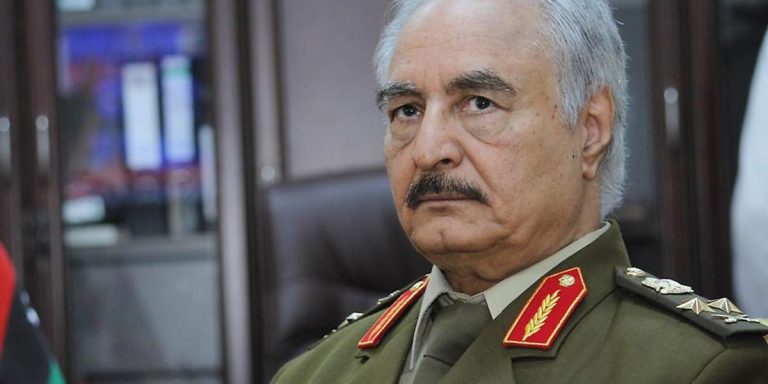INTELBRIEF
July 29, 2019
IntelBrief: Haftar’s Growing Criminal Enterprise in Libya

- Throughout Libya’s civil war, widespread allegations have surfaced that strongman Khalifa Haftar operates as a modern-day warlord, using his power to further numerous criminal enterprises.
- To fund the LNA’s activities, Haftar’s network has turned to a range of criminal activities and illicit financial flows.
- The LNA also maintains close connections to the human trafficking networks that traverse Libya, although Haftar’s involvement in the human smuggling business is more about politics than economics.
- If Haftar and the LNA prevail in their quest to control Libya, the future will be one of a rentier state that relies on patronage networks and has little incentive to engineer genuine political reform.
.
Throughout the bloody stalemate that is Libya’s civil war, widespread allegations have surfaced that strongman Khalifa Haftar operates as a modern-day warlord seeking to consolidate his grip on power to further his burgeoning criminal enterprises. Haftar’s militias, constituted as the Libyan National Army (LNA), are based in the east of the country and since April have been fighting in and around the capital, Tripoli. The longer the conflict drags on, the greater the demand it places on Haftar to sustain the resources necessary to continue fighting. External intervention in the conflict by a range of nation-states has only served to prolong the stalemate. Haftar has received support from Russia, France, Egypt, Saudi Arabia, and the United Arab Emirates. The Government of National Accord (GNA) also receives external support, including from Turkey.
To fund this fight, and the LNA’s larger battle, Haftar’s network has turned to a range of criminal activities and illicit financial flows, as outlined in a recent report by the Global Initiative Against Transnational Organized Crime. These include smuggling and trafficking, but also various forms of racketeering, extortion, and the misappropriation of public funds and corruption. Tax-exempt status and monopolies over export businesses have interfered with the functioning of the private sector in eastern Libya. By using force or the threat of force, the LNA has coerced public and private sector officials, gaining access to infrastructure and private property in the process. The reliance on illicit funding also extends to the export of recycled scrap and the smuggling of refined oil and petroleum products. Under Haftar, the LNA has been able to squeeze the local banking system in eastern Libya while also relying on Russian-printed dinars.
The LNA also maintains close connections to the human trafficking networks that traverse Libya, although Haftar’s involvement in the human smuggling business is more about politics than economics. The LNA collaborates with a number of smuggling networks, offering military and political support in exchange for influence with the constituencies with which these smugglers hold sway. In collaboration with the Subul al-Salam militia, recent reporting suggests that military commanders in the LNA have growing connections to the drug trade throughout the region of al-Kufra. If Haftar and the LNA prevail in their quest to control Libya, the future will be one of a rentier state that relies on patronage networks and has little incentive to engineer genuine political reform.
In June 2017, Ghassan Salamé was appointed as the new Special Representative of the UN Secretary-General for Libya and immediately raised the issue of Libya’s predatory economy. Throughout the country, rapacious warlords are backed by violent non-state armed groups attempting to capture and control state resources. The UN Security Council moved to sanction five Libyans involved in criminal activities including human smuggling and racketeering. But the issue deserves greater urgent attention. Unless the international community does more to end the conflict in Libya, this oil-rich nation on the Mediterranean will devolve further into criminality and state failure. And with no clear end in sight, the most likely scenario is continued fighting and a struggle for control between the country’s countless militias that have already divided Libya into personal fiefdoms.
.
For tailored research and analysis, please contact: info@thesoufancenter.org